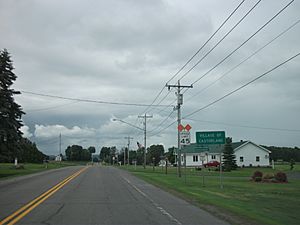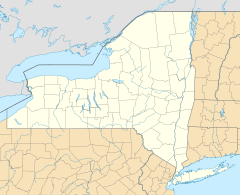Castorland, New York facts for kids
Quick facts for kids
Castorland, New York
|
|
|---|---|
|
Village
|
|

Entering the village of Castorland via New York State Route 410 eastbound in February 2012
|
|
| Country | United States |
| State | New York |
| County | Lewis |
| Town | Denmark |
| Area | |
| • Total | 0.32 sq mi (0.83 km2) |
| • Land | 0.32 sq mi (0.83 km2) |
| • Water | 0.00 sq mi (0.00 km2) |
| Elevation | 741 ft (226 m) |
| Population
(2020)
|
|
| • Total | 334 |
| • Density | 1,040.50/sq mi (401.66/km2) |
| Time zone | UTC-5 (Eastern (EST)) |
| • Summer (DST) | UTC-4 (EDT) |
| ZIP code |
13620
|
| Area code(s) | 315 |
| FIPS code | 36-12881 |
| GNIS feature ID | 946006 |
Castorland is a small village located in Lewis County, New York, United States. It is found north of Lowville and southeast of Carthage. In 2019, about 360 people lived in Castorland.
Contents
The History of Castorland Village
The name "Castorland" means "Land of the Beaver." This name comes from a group of people who moved there in 1792. They were escaping the French Revolution and looking for a new home away from the violence.
Founding the French Colony
These settlers bought a huge piece of land, about 210,000 acres (850 square kilometers). This land was originally part of something called Macomb's Purchase. A company named La Compagnie de New York bought it. The name "Castorland" is a direct translation of the old Native American name for the area, Couch-sach-ra-ga.
Challenges and Changes
The new colony faced many difficulties. They had very harsh winters and problems with planning. They also lost their farm animals and money. Because of these challenges, the colony officially ended in 1814. Many of the original settlers either went back to Europe or moved to bigger towns nearby.
Geography of Castorland
Castorland is located in the southeast part of the town of Denmark. You can find it at coordinates 43°53′15″N 75°30′50″W. The village sits on higher ground on the west side of the Black River valley. The Beaver River flows into the Black River nearby.
Location and Nearby Towns
The village is directly on New York State Route 410. The village of Croghan is about 7 miles (11 km) to the east. Lowville is about 8 miles (13 km) to the south. Carthage is about 9 miles (14 km) to the northwest.
Village Size
According to the United States Census Bureau, Castorland village covers a total area of about 0.8 square kilometers (0.3 square miles). All of this area is land.
People of Castorland
The number of people living in Castorland has changed over the years.
| Historical population | |||
|---|---|---|---|
| Census | Pop. | %± | |
| 1930 | 315 | — | |
| 1940 | 309 | −1.9% | |
| 1950 | 308 | −0.3% | |
| 1960 | 321 | 4.2% | |
| 1970 | 327 | 1.9% | |
| 1980 | 277 | −15.3% | |
| 1990 | 292 | 5.4% | |
| 2000 | 306 | 4.8% | |
| 2010 | 351 | 14.7% | |
| 2020 | 334 | −4.8% | |
| U.S. Decennial Census | |||
Population in 2000
In the year 2000, there were 306 people living in Castorland. These people made up 115 households and 74 families. The village had about 1,085 people per square mile (419 people per square kilometer).
Most of the people in the village (97.06%) were White. A small number were from other racial backgrounds. About 1.31% of the population identified as Hispanic or Latino.
Households and Families
Out of the 115 households, about 28.7% had children under 18 living with them. Most households (58.3%) were married couples living together. The average household had 2.56 people, and the average family had 3.23 people.
Age Distribution
The population in 2000 was spread out by age. About 24.8% of the people were under 18 years old. About 15.0% were 65 years or older. The average age in the village was 38 years old.
The Castorland Medal
In 1796, the Paris Mint made a special coin-like token called a jeton. It was about the size of a half dollar. This token was created to celebrate the "Franco-American Colony" (which was Castorland).
Collecting the Medal
Since then, many new copies of this medal have been made. Collectors can still buy them today. Even though it's listed in a famous coin book called A Guide Book of United States Coins, this medal was never meant to be used as money. It was more like a souvenir or a commemorative item.
See also
 In Spanish: Castorland para niños
In Spanish: Castorland para niños
 | Dorothy Vaughan |
 | Charles Henry Turner |
 | Hildrus Poindexter |
 | Henry Cecil McBay |



